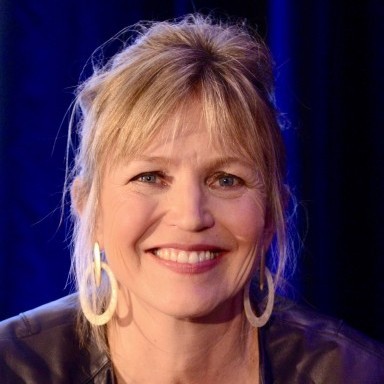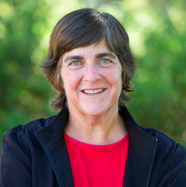Math, Computers, & Music

Highlights
When Jennifer Widom began her career in computer science, it was a relatively narrow and specialized field. Three decades later, computer science has become an interdisciplinary field that touches on broad swaths of society and promises solutions to global problems such as healthcare and sustainability, she says. “Computer science used to be a niche. But (it) has become much more broadly used, broadly applicable across all fields. Instead of it just being a narrow study of software and hardware, it’s now a lot about what you can use that software and hardware for in other fields,” says Widom.
Indeed, learning about the relationships between math, computers and music prompted Widom to make a radical career change. Her undergraduate degree is in music, and she was on a path to become an orchestral trumpet player. But a course focused on computer applications for music was so intriguing she shifted her studies, eventually becoming a computer scientist and the dean of the School of Engineering at Stanford.
Increasingly, jobs in industries related to computer science will be broader and encompass the need for data science at its core. “We’ll still need straight-line software engineers, but there will be more jobs for people with additional skills and interests,” Widom said in an interview recorded for the Women in Data Science podcast at Stanford University. That shift may well make the field more attractive to women, she says.
Computer science has become so popular that nearly 20 percent of the student body at Stanford is majoring in it, and the university is struggling to keep up with demand, she says. Data science continues to play an important role in its continued evolution as more and more students use data to solve complex problems. But what do those students really want? “Are the students who are coming to computer science coming because they want to learn just the computer science, or are they coming because they want to apply computer science to their other interests? I’m going to venture a guess that the second is true for a lot of those students,”Widom says. If that’s the case, Stanford and other universities will need to shift the computer curriculum to be more reflective of its newly interdisciplinary nature, she says.
Widom pioneered the use of MOOCs —massive open online courses —and says teaching them “was one of the most invigorating and exciting things I think I’ve done in my whole career.” The experience of reaching so many people —her first effort attracted 100,000 students —inspired her to take a sabbatical in which she traveled to under-developed countries offering free short-courses, workshops and roundtables, covering such topics as big data, collaborative problem-solving and women in technology. Her “instructional odyssey” was not only personally gratifying, but it shaped her teaching. “I think, based on my experience with the MOOCs and travel, that the way I could best influence people directly would be to show up and teach them,” she says. “I just really loved reaching people all over the world.”

About the Host
Margot Gerritsen
Stanford Professor [Emerita] Margot Gerritsen is the Executive Director and co-founder of Women in Data Science Worldwide (WiDS) and born and raised in the Netherlands. Margot received her MSc in Applied Mathematics from Delft University of Technology before moving to the US in search of sunnier and hillier places. In. 1996 she completed her PhD in Scientific Computing & Computational Mathematics at Stanford University and moved further West to New Zealand where she spent 5 years at the University of Auckland as a lecturer in Engineering Science. In 2001, she returned to Stanford as faculty member in Energy Resources Engineering. Margot was the Director of the Institute for Computational & Mathematical Engineering (ICME) at Stanford from 2010-2018 and the Senior Associate Dean for Educational Affairs in Stanford’s School of Earth Sciences from 2015-2020. In 2022, Margot took Emerita status to devote herself to WiDS full time. Margot is a Fellow of the Society of Industrial & Applied Mathematics, and received honorary doctorates from Uppsala University, Sweden, and the Eindhoven University of Technology in the Netherlands. She now lives in Oregon with her husband Paul.
Connect with Margot Gerritsen on Twitter (@margootjeg) and LinkedIn.
Find out more about Margot on her Stanford Profile.


